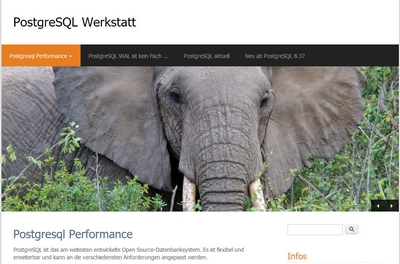Sammlung von Newsfeeds
Tomas Vondra: Fun and weirdness with SSDs
When I started working with Postgres (or databases in general) 25 years ago, storage systems looked very different. All storage was “spinning rust” - rotational disks with various interfaces (SATA/SAS/…) and speeds (7.2K/10k/15k/…). The spindle speed was the main performance determining feature, and everyone knew what IOPS and bandwidth to expect from a disk. The general behavior was pretty much the same.
Stefanie Janine: Postgresql Performance
Elizabeth Garrett Christensen: Postgres Logging for Performance Optimization
A modern-day Postgres instance creates robust and comprehensive logs for nearly every facet of database and query behavior. While Postgres logs are the go-to place for finding and debugging critical errors, they are also a key tool in application performance monitoring.
Alexander Korotkov: Ordered Insertion Optimization in OrioleDB
When many sessions try to insert into the same B-tree leaf page, classic exclusive page locking serializes progress and wastes time on sleep/wake cycles. We’re introducing a batch page insertion path that lets the session holding the page lock insert for itself and its neighbors. The result: dramatically reduced lock waits, and big gains at high client counts (2X throughput boost starting from 64 clients in our benchmark).
Stefanie Janine: pgsql_tweaks 0.11.5 Released
One could install the whole package, or just copy what is needed from the source code.
The extension is also available on PGXN.
The extension is also availabe through the PostgreSQL rpm packages.
General changesNo code has been changed.
Ian Barwick: PgPedia Week, 2025-08-03
Regina Obe: PostGIS 3.6.0rc1
The PostGIS Team is pleased to release PostGIS 3.6.0rc1! Best Served with PostgreSQL 18 Beta3 and soon to be released GEOS 3.14.
This version requires PostgreSQL 12 - 18beta3, GEOS 3.8 or higher, and Proj 6.1+. To take advantage of all features, GEOS 3.14+ is needed. To take advantage of all SFCGAL features, SFCGAL 2.2.0+ is needed.
Stefanie Janine: pgsql_tweaks 0.11.4 Released
One could install the whole package, or just copy what is needed from the source code.
The extension is also available on PGXN.
The extension is also availabe through the PostgreSQL rpm packages.
Robert Haas: Hacking Workshop for September 2025
Next month, I'll be hosting 2 or 3 discussions of David Rowley's talk, Writing fast C code for a modern CPU (and applying it to PostgreSQL), given at 2025.pgconf.dev (talk description here).
Robins Tharakan: Testing PostgreSQL on Debian/Hurd: A Windows + QEMU Adventure
Gabriele Bartolini: CNPG Recipe 21 – Finer Control of Postgres Clusters with Liveness Probes
In this article, I explore how CloudNativePG 1.27 enhances PostgreSQL liveness probes, including primary isolation checks that mitigate split-brain scenarios and integrate seamlessly with Kubernetes. We also discuss how these improvements lay the groundwork for advanced features like quorum-based failover while maintaining stability, safety, and community-driven decision-making.
Sergey Solovev: The PostgreSQL Hacker Helper extension is one year old
PostgreSQL Hacker Helper is a VS Code extension for developing PostgreSQL source code. A couple of days ago (August 9th), one year has passed since the release of version 1.0.0.
Initially, it was a utility for dynamically calculating expressions and casting variables, but after a while I realized that not everything is so simple. The main catch is that there are types (if you can say so) that require special treatment.
Francesco Tisiot: Free PostgreSQL® in the Cloud
A short summary of Free PostgreSQL® services in the cloud as of August 14th 2025
Jan Wieremjewicz: pg_stat_monitor Needs You! Join the Feedback Phase
At Percona, we believe that great open source software is built with the Community, not just for it. As we plan the next iteration of pg_stat_monitor, our advanced PostgreSQL monitoring extension, we’re taking a closer look at the current feature set and how it aligns with real-world usage. In open source, the community isn’t just a user base, it’s the most important stakeholder. While we set the vision, your feedback is the compass that guides us.
Laurenz Albe: Should I rebuild my PostgreSQL index?
© Laurenz Albe 2025
Ian Barwick: PgPedia Week, 2025-07-27
Lætitia AVROT: PG Lord of the Ring
Craig Kerstiens: Indexing JSONB in Postgres
Postgres is amazing for many reasons. One area that doesn't get near enough attention is datatypes. Postgres has a rich set of datatypes and one important one for devs to be especially excited about is JSONB.
JSONB which is structured and indexable. In JSON, the B stands for binary (or as we like to think of it B is for better), which means data is pre-parsed as it is stored. How do you get the most out of JSONB from a retrieval perspective? Enter Postgres' rich indexing support.

